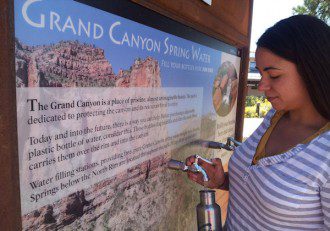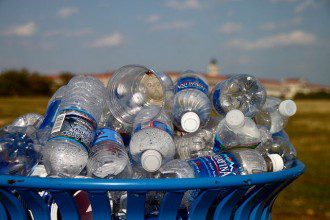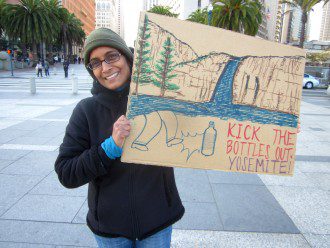12th November 2015
Contributing Writer for Wake Up World
In a move praised by conservationists, as well as those who care about human and environmental health, 20 national parks in the U.S. have sworn off bottled water sales within their boundaries — including the Grand Canyon, Canyonlands, Arches, Zion and Bryce Canyon. Considered a “sustainability success story” by park administrators, Zion and other national parks have taken a major step towards reducing plastic waste. In Zion alone, the park has put an end to the annual sale of 60,000 bottles of water, eliminating a hefty 5,000 pounds of plastic waste per year.
However, visitors aren’t left high and dry — far from it. Instead, water-filling stations dot the park, where canteens and reusable bottles can be filled with safe, pure spring water. A seemingly win-win situation, there are those who are opposing the program — specifically, The International Bottled Water Association (IBWA). The organization includes big names like Nestlé, Evian, Dasani, Danone, Grand Springs and Glacier Springs, along with 200 others, who have a vested interest in keeping bottle water sales alive and kicking within the National Park System.
The Battle Between Corporate Profit and a Clean Environment
As of July 2015, IBWA has spent approximately $510,000 to lobby members of Congress, with national parks its top priority this year. If the ban on selling bottled water in national parks isn’t reversed, Big Water has plenty to lose. Take Pennsylvania, where the bottled water industry brings in $5.5 billion annually.
So how does the industry protect its market in national parks? Enlist a government representative to include an obscure amendment within an appropriations bill, who then proceeds to pitch the legislation to Congress under a false pretense.
According to the Washington Post:
“Families who don’t own expensive camping equipment and aren’t experienced hikers and climbers will be surprised to find out that they can’t buy their child a bottle of water at one of our national parks,” Rep. Keith Rothfus (R-Pa.) said on the House floor as he introduced the legislation, which is on hold while lawmakers suspend work on appropriation bills to debate their differences over the Confederate flag. “Temperatures at the Grand Canyon just this week will top 100 degrees. Visitors who may have forgotten or have run out of water could be put at risk of dehydration.”
Rothfus has proven himself to be a master of manipulating public opinion, conveniently omitting crucial information — like reusable bottles are on hand for purchase within the parks for around $2.50 (if visitors forget to bring their own) and pure spring water refilling stations are readily available. He also forgot to mention that individuals are free to bring in their own bottled water, it’s just not available for sale within the park.
Moreover, Rothfus fails to acknowledge the environmental and health impacts of single-use water bottles. The amount of plastic used by Americans in 2006 for bottled water required 17 million barrels of oil to create — or the equivalent of fueling one million cars for a year.
In response to criticism from environmental groups, bottled water companies assert that recycling is a solution to the waste the industry creates, but the reality is that only 31 percent of plastic water bottles find their way into recycling programs. Also keep in mind that plastic can only be recycled once, then it’s off to the landfill, or worse, the ocean. Once it starts to breakdown, toxic chemicals are released, like DDT and PCB — which are linked to cancer, infertility, liver damage and disorders of the immune, reproductive, nervous and endocrine systems.
Sadly, the amendment “to prohibit use of funds by the Director of the National Park Service to implement, administer, or enforce Policy Memorandum 11-03 or to approve a request by a park superintendent to eliminate the sale in National Parks of water in disposable plastic bottles,” was approved by Congress July 8, 2015. [Source]
In a press release by IBWA, the organization further distorts the national park ban by stating:
“A 2011 NPS policy allows national parks to ban the sale of bottled water in plastic containers. The House’s rejection of that policy is a vote for public health and safety. Bans on the sale of bottled water contradict the NPS’s Healthy Parks Healthy People initiative, which promotes more healthy food and beverage choices in national parks, and First Lady Michelle Obama’s Drink Up Initiative, which encourages the consumption of all types of water, whether filtered, tap, or bottled.”
Like Rothfus, IBWA ignores the fact that it’s just as easy to purchase a reusable water bottle as it is to buy bottled water. This is not an issue concerning proper hydration. It’s simply about corporate profit.
Chris Hogan, IBWA Vice President of Communications, also claims limited access to bottled water can negatively impact health:
“Research has shown that when bottled water isn’t available, 63 percent of people will choose soda or another sugary drink – not tap water. “We also know that when bottled water is not available in a vending machine, people choose other less-healthy packaged beverages, which may contain sugar, caffeine, and other additives.”
Yet, in the same press release, IBWA states: “The Rothfus amendment would not prohibit parks from continuing to authorize the sale of other beverages or from providing tap water filling stations to promote hydration.” Apparently, the IBWA feels tap water is acceptable because no one will choose it, but free spring water through refilling stations shouldn’t be allowed.
Even if federal money used by national parks to replace bottled water with refilling stations is cut-off, the park service said it will continue with the program, which will likely be funded by nonprofit groups.
But Big Water doesn’t take kindly to being thwarted. As the Portland Press Herald reports:
“Joe Doss, president and chief executive officer of the bottled water association, said that even if the Park Service can legally use private money to pay for bottled water alternatives, it should be careful about even thinking about subverting the (possible) will of Congress.”
Article sources:
- https://www.congress.gov/bill/114th-congress/house-bill/2822
- https://www.washingtonpost.com/news/federal-eye/wp/2015/07/13/how-big-water-is-trying-to-stop-the-national-park-service-from-cleaning-up-plastic-bottles/
- http://www.reuters.com/article/2012/02/08/us-grandcanyon-bottles-idUSTRE8171KO20120208
- http://www.bottledwater.org/ibwa-applauds-house-action-ensure-all-national-park-visitors-have-access-safe-healthy-water
- http://www.pressherald.com/2015/07/30/u-s-park-refill-stations-vs-bottle-water-industry/
- http://www.treehugger.com/culture/north-americas-bottled-water-addiction-comes-steep-price.html
Previous articles by Carolanne Wright:
- Considering the Flu Shot? Here are Five Reasons to Think Twice
- Dr Sebi: The Man Who Cures Aids, Cancer, Diabetes and More
- Plastic-Eating Mushroom Discovered in the Amazon Rainforest — A Solution for Our Trash Saturated World?
- Chronic Lyme Disease: A Modern Plague the Government Chooses to Ignore
- Big Pharma and Organized Crime — They are More Similar Than You May Think
- Over 100 Scientific Studies Agree: Cannabis Annihilates Cancer
- Emotional Energetic Healing: The Future of Medicine is Here
- Why Every Parent Should Consider Unschooling
- The Greenhouse of the Future: Grow Your Own Food Year-Round With This Revolutionary System
- First U.S. City Produces More Electricity Than It Uses — With 100% Renewable Technology
- Autistic Boy with Higher IQ Than Einstein Discovers Gift After Removal from State-Run Therapy
About the author:
 Carolanne enthusiastically believes if we want to see change in the world, we need to be the change. As a nutritionist, natural foods chef and wellness coach, Carolanne has encouraged others to embrace a healthy lifestyle of organic living, gratefulness and joyful orientation for over 13 years
Carolanne enthusiastically believes if we want to see change in the world, we need to be the change. As a nutritionist, natural foods chef and wellness coach, Carolanne has encouraged others to embrace a healthy lifestyle of organic living, gratefulness and joyful orientation for over 13 years
Through her website Thrive-Living.net she looks forward to connecting with other like-minded people from around the world who share a similar vision. Follow Carolanne on Facebook, Twitter and Pinterest.
Source Article from http://wakeup-world.com/2015/11/12/bottled-water-industry-and-national-parks-clash-over-plastic-waste-ban/
Related posts:
Views: 0
 RSS Feed
RSS Feed

















 November 11th, 2015
November 11th, 2015  Awake Goy
Awake Goy 


 Posted in
Posted in  Tags:
Tags: 
















